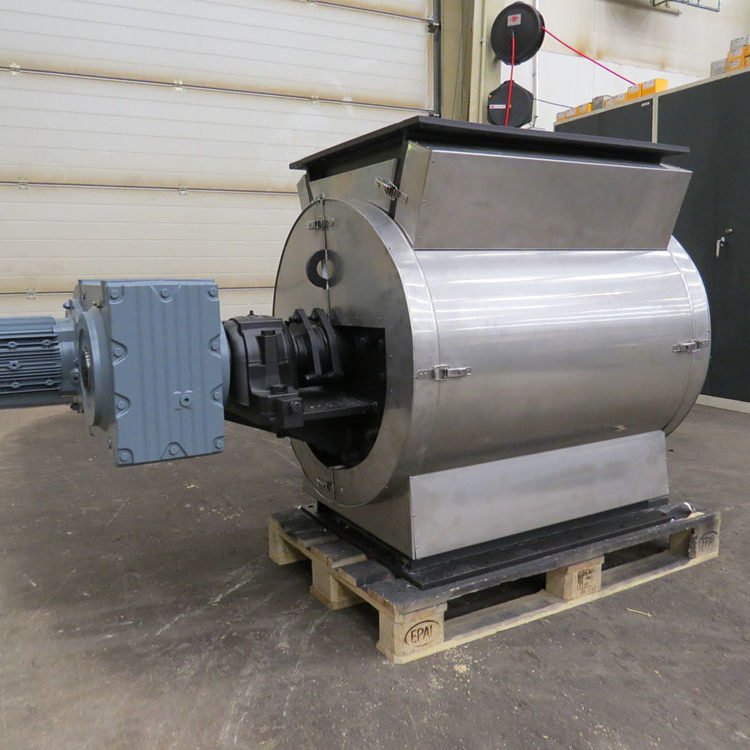Introduction to Rotary Valves
Rotary valves, also known as rotary airlocks or rotary feeders, are critical components in various manufacturing processes. These devices are designed to control the flow of bulk materials from one chamber to another while maintaining a consistent pressure differential. Their ability to handle a wide range of materials, from fine powders to large granules, makes them indispensable in many industrial applications.
In manufacturing, the efficiency and reliability of material handling systems are paramount. Rotary valves play a crucial role in ensuring that materials are transferred smoothly and efficiently, minimizing downtime and maximizing productivity. Their robust design and versatility make them suitable for a variety of industries, including cement, mining, and chemical processing.
Precision in Material Handling
One of the primary reasons rotary valves are essential in manufacturing is their ability to provide precise control over material flow. This precision is vital in processes where the accurate dosing of materials is required. For instance, in the production of cement, the correct proportion of raw materials must be maintained to ensure the quality of the final product.
Rotary valves achieve this precision through their rotating mechanism, which allows for a consistent and controlled release of materials. This level of control helps prevent material wastage and ensures that the manufacturing process remains efficient and cost-effective. Additionally, the ability to handle various material types and sizes further enhances their utility in diverse manufacturing environments.
Maintaining pressure differentials
In many manufacturing processes, maintaining a pressure differential between different chambers is crucial. Rotary valves are designed to create an airtight seal, which helps maintain the required pressure levels. This feature is particularly important in pneumatic conveying systems, where the movement of materials is driven by air pressure.
By maintaining a consistent pressure differential, rotary valves help ensure the smooth and efficient transfer of materials. This capability is essential in processes where pressure fluctuations can lead to material blockages or system inefficiencies. The ability to maintain pressure differentials also contributes to the overall safety and reliability of the manufacturing process.
Durability and Reliability
Manufacturing environments can be harsh, with equipment often exposed to abrasive materials, high temperatures, and continuous operation. Rotary valves are built to withstand these challenging conditions, offering durability and reliability that are essential for maintaining uninterrupted production.
The robust construction of rotary valves, typically made from high-quality materials such as stainless steel or cast iron, ensures they can handle the rigors of industrial use. Their design also includes features such as wear-resistant coatings and replaceable components, which help extend their operational life and reduce maintenance requirements.
Versatility in Applications
Rotary valves are incredibly versatile, making them suitable for a wide range of applications in manufacturing. They can handle various types of materials, including powders, granules, and pellets, and are used in processes such as feeding, dosing, and discharging.
This versatility is further enhanced by the availability of different valve designs and configurations. For example, some rotary valves are designed for high-temperature applications, while others are optimized for handling abrasive materials. This adaptability makes rotary valves a valuable asset in diverse manufacturing settings, from cement production to chemical processing.
Enhancing process efficiency
Efficiency is a key consideration in manufacturing, and rotary valves contribute significantly to optimizing process efficiency. By providing precise control over material flow and maintaining pressure differentials, these valves help ensure that manufacturing processes run smoothly and without interruption.
Moreover, the ability of rotary valves to handle a wide range of materials and operating conditions means they can be integrated into various stages of the manufacturing process. This integration helps streamline operations, reduce material wastage, and minimize downtime, ultimately leading to increased productivity and cost savings.
Reducing maintenance and downtime
Maintenance and downtime are significant concerns in manufacturing, as they can lead to production delays and increased operational costs. Rotary valves are designed with features that help minimize maintenance requirements and reduce the risk of unexpected breakdowns.
For instance, many rotary valves include easily replaceable components, such as wear plates and seals, which can be quickly swapped out during routine maintenance. Additionally, their robust construction and wear-resistant materials help extend the intervals between maintenance cycles, further reducing downtime and associated costs.
Conclusion
Rotary valves are essential components in manufacturing, offering precision, reliability, and versatility that are crucial for efficient material handling. Their ability to maintain pressure differentials, handle a wide range of materials, and withstand harsh operating conditions makes them indispensable in various industrial applications.
By enhancing process efficiency, reducing maintenance requirements, and ensuring the smooth transfer of materials, rotary valves play a vital role in optimizing manufacturing operations. Their importance in maintaining the continuity and quality of production processes cannot be overstated, making them a key asset in the manufacturing industry.

You have a challenge that needs solving?
Let us help! Contact us for more information about our products and services.
